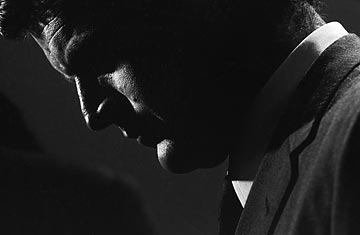
Ted Kennedy, shortly after the infamous Chappaquiddick incident involving Mary Jo Kopechne
(2 of 2)
"There may be something in the very nature of public achievement that brings with it this risk-taking behavior," observes Edward Klein, who has written five books on the Kennedy family. "People who cheat on exams —probably there is something in them that wants to get caught."
His marriage in 1958 to Joan Bennett was strained by Kennedy's alleged infidelities, a habit he reportedly shared with his father Joe and his brothers Bobby and Jack, who also, historians say, probably strayed from their marital vows. In 1969, after leaving a party with a young single woman under ambiguous circumstances, Ted Kennedy steered an Oldsmobile into the waters off Massachusetts' Chappaquiddick Island. Kennedy escaped the sinking car, but the woman, Mary Jo Kopechne, died. He waited about 10 hours before reporting the accident to police and later pleaded guilty to leaving the scene of an accident.
After his divorce from Joan, Kennedy's hard-partying lifestyle became a growing issue. A 1979 article in TIME noted that Kennedy's "private peccadilloes" had sparked a major editorial debate among Washington news organizations about the public relevance of private behavior in advance of the 1980 elections. In 1990, Gentlemen's Quarterly published an exposé on the subject of Kennedy's drinking and womanizing with girls in their 20s. The story recounted a number of embarrassing incidents, including one in which Kennedy was allegedly discovered by a restaurant waitress having sex with a female lobbyist on the floor of a private dining room. The check showed they had ordered two bottles of chardonnay for lunch.
A few years later, Kennedy became involved in yet another embarrassment when, following a party he attended at a Kennedy family house in Palm Beach, Fla., his nephew William Kennedy Smith was accused of raping a young woman. Though Kennedy, then 59, was never implicated in the crime and Smith was eventually acquitted, Kennedy testified at the trial about the drunken evening in which a group of men had traveled into town to pick up two younger women at a bar.
In part because of his reputation with women, Kennedy took a surprisingly passive role in the 1991 Supreme Court confirmation hearings of Justice Clarence Thomas, who was accused of sexual harassment. This upset many of Kennedy's liberal supporters who remembered his leadership in defeating the nomination of Robert Bork a few years earlier. In a 1991 speech at Harvard, after the hearings, Kennedy acknowledged his misbehavior and apologized. "I recognize my own shortcomings — the faults in the conduct of my private life. I realize that I alone am responsible for them, and I am the one who must confront them," he said. Shortly afterward, he did reform his ways, marrying Vicki Reggie in 1992.
Perhaps the most striking thing about this pattern is that Kennedy was able to overcome it. His legacy is not one of a scamp or a drunkard but rather one of a statesman who defeated his personal demons to earn the respect of his peers and much of his nation.
